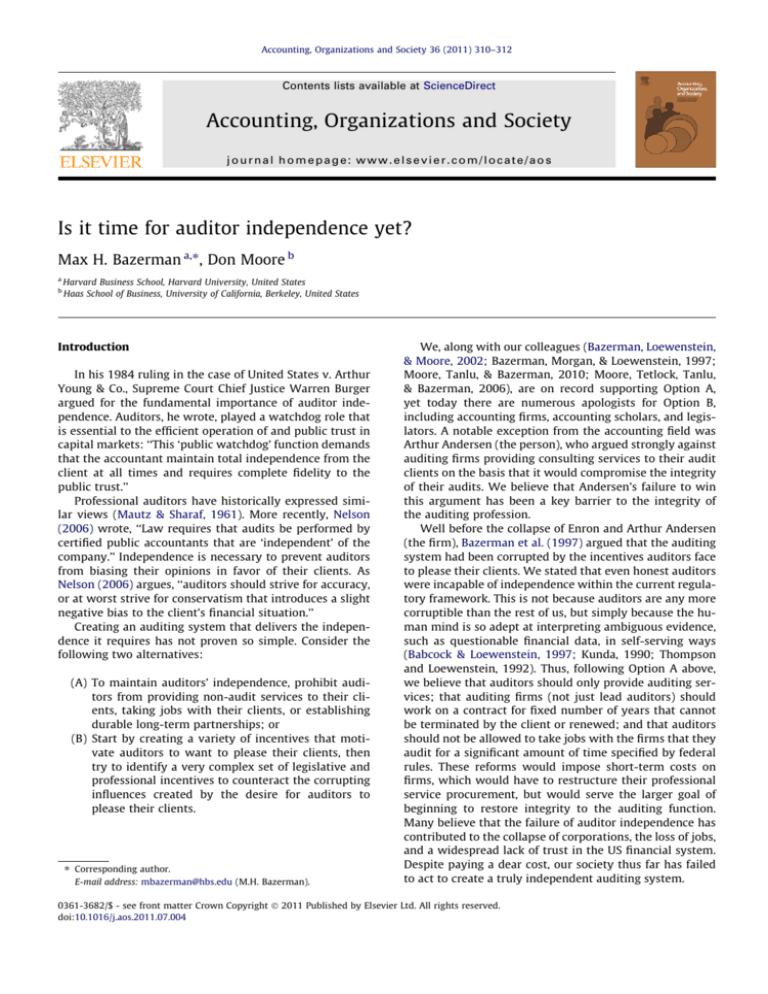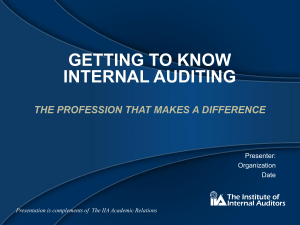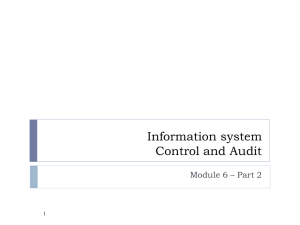
Accounting, Organizations and Society 36 (2011) 310–312
Contents lists available at ScienceDirect
Accounting, Organizations and Society
journal homepage: www.elsevier.com/locate/aos
Is it time for auditor independence yet?
Max H. Bazerman a,⇑, Don Moore b
a
b
Harvard Business School, Harvard University, United States
Haas School of Business, University of California, Berkeley, United States
Introduction
In his 1984 ruling in the case of United States v. Arthur
Young & Co., Supreme Court Chief Justice Warren Burger
argued for the fundamental importance of auditor independence. Auditors, he wrote, played a watchdog role that
is essential to the efficient operation of and public trust in
capital markets: ‘‘This ‘public watchdog’ function demands
that the accountant maintain total independence from the
client at all times and requires complete fidelity to the
public trust.’’
Professional auditors have historically expressed similar views (Mautz & Sharaf, 1961). More recently, Nelson
(2006) wrote, ‘‘Law requires that audits be performed by
certified public accountants that are ‘independent’ of the
company.’’ Independence is necessary to prevent auditors
from biasing their opinions in favor of their clients. As
Nelson (2006) argues, ‘‘auditors should strive for accuracy,
or at worst strive for conservatism that introduces a slight
negative bias to the client’s financial situation.’’
Creating an auditing system that delivers the independence it requires has not proven so simple. Consider the
following two alternatives:
(A) To maintain auditors’ independence, prohibit auditors from providing non-audit services to their clients, taking jobs with their clients, or establishing
durable long-term partnerships; or
(B) Start by creating a variety of incentives that motivate auditors to want to please their clients, then
try to identify a very complex set of legislative and
professional incentives to counteract the corrupting
influences created by the desire for auditors to
please their clients.
⇑ Corresponding author.
E-mail address: mbazerman@hbs.edu (M.H. Bazerman).
We, along with our colleagues (Bazerman, Loewenstein,
& Moore, 2002; Bazerman, Morgan, & Loewenstein, 1997;
Moore, Tanlu, & Bazerman, 2010; Moore, Tetlock, Tanlu,
& Bazerman, 2006), are on record supporting Option A,
yet today there are numerous apologists for Option B,
including accounting firms, accounting scholars, and legislators. A notable exception from the accounting field was
Arthur Andersen (the person), who argued strongly against
auditing firms providing consulting services to their audit
clients on the basis that it would compromise the integrity
of their audits. We believe that Andersen’s failure to win
this argument has been a key barrier to the integrity of
the auditing profession.
Well before the collapse of Enron and Arthur Andersen
(the firm), Bazerman et al. (1997) argued that the auditing
system had been corrupted by the incentives auditors face
to please their clients. We stated that even honest auditors
were incapable of independence within the current regulatory framework. This is not because auditors are any more
corruptible than the rest of us, but simply because the human mind is so adept at interpreting ambiguous evidence,
such as questionable financial data, in self-serving ways
(Babcock & Loewenstein, 1997; Kunda, 1990; Thompson
and Loewenstein, 1992). Thus, following Option A above,
we believe that auditors should only provide auditing services; that auditing firms (not just lead auditors) should
work on a contract for fixed number of years that cannot
be terminated by the client or renewed; and that auditors
should not be allowed to take jobs with the firms that they
audit for a significant amount of time specified by federal
rules. These reforms would impose short-term costs on
firms, which would have to restructure their professional
service procurement, but would serve the larger goal of
beginning to restore integrity to the auditing function.
Many believe that the failure of auditor independence has
contributed to the collapse of corporations, the loss of jobs,
and a widespread lack of trust in the US financial system.
Despite paying a dear cost, our society thus far has failed
to act to create a truly independent auditing system.
0361-3682/$ - see front matter Crown Copyright Ó 2011 Published by Elsevier Ltd. All rights reserved.
doi:10.1016/j.aos.2011.07.004
M.H. Bazerman, D. Moore / Accounting, Organizations and Society 36 (2011) 310–312
In 2000, SEC chair Arthur Levitt held congressional
hearings on the issue of auditor independence due to his
concern that delivering consulting services could impair
auditor judgment. For reasons we detail below, those hearings produced little action. Since then, our economy has
seen financial disasters in which the rate of auditor
involvement is disturbing. Yet we still have failed to reform
the auditing system to provide meaningful auditor
independence.
There are many barriers to change. In this short article,
we highlight two of the most significant barriers.
Barriers to independence
One critical barrier to auditing reforms is the political
activity of accounting firms. During Levitt’s 2000 congressional hearings, the leading accounting firms engaged no
fewer than seven lobbying firms to fight his reform proposal. According to the information available at
www.OpenSecrets.org, the leading accounting firms donated over $10 million to national political campaigns
and spent another $12.6 million on federal lobbying during
2000.
Levitt received dozens of letters opposing his efforts
from corporate executives and congressmen. On September 20, 2000, Enron Chairman Kenneth Lay wrote to Levitt
to attest to the benefits his energy trading company had received from one-stop-shopping with Arthur Andersen:
‘‘. . .Enron has found its ‘integrated audit’1 arrangement to
be more efficient and cost-effective than the more traditional roles of separate internal and external auditing functions’’ (Lay, 2000). Andersen’s services to Enron were more
comprehensive than Levitt knew; it turned out that David
Duncan, the Andersen partner in charge of Enron’s audits,
had written Lay’s letter with help from Andersen’s Washington lobbying firm (Smith, 2002).
During the 2000 hearings, Joseph Berardino, the CEO of
Arthur Andersen, testified that his firm had put ‘‘significant
new measures’’ in place ‘‘to bring greater audit committee
scrutiny over scope of practice.’’ According to Berardino,
‘‘With audit committees just beginning to exercise this
new authority, we see no reason to conclude that they will
not discharge their oversight duties responsibly. . . Before
we radically alter the audit landscape with new rules, we
should give audit committees a chance to do their job.
We share the conclusion of the majority of the Panel on
Audit Effectiveness, which viewed ‘any notions that audit
committees have not made or cannot make reasoned judgments about independence matters’ as unfairly impugning
the abilities and integrity of these committees.’’
Also during this time, Representative Billy Tauzin led
the campaign against auditing reform in Congress, after
receiving more than $280,000 in campaign contributions
from the accounting industry in the 1990s. Finally, House
Appropriations Committee Member Henry Bonilla threatened to slash the SEC’s budget if Levitt did not back down
1
Lay was referring to services where the audit was part of a broader set
of professional services, including consulting services. He was not referring
to the PCAOB’s current use of the term ‘‘integrated audit’’.
311
on auditor independence (Mayer, 2002). Reluctantly, Levitt
gave up the fight—a decision he later called his biggest
mistake as SEC chief (Levitt, 2002).
A second and related barrier to creating auditor reform
is the human tendency to overvalue the status quo. Virtually whenever a significant reform is proposed, some people can be expected to resist it by insisting that more
evidence is needed before a change is made (Bazerman,
Baron, & Shonk, 2001). At the 2000 SEC hearing, Berardino
was joined by KPMG Vice President J. Terry Strange and
Deloitte and Touche Partner Robert Garland in demanding
that, before moving ahead with reform, the SEC provide
evidence of past instances of audit fraud caused by auditing firms’ consulting business. ‘‘Given what is at stake,’’
Garland argued, ‘‘and the fact that there is no demonstrated problem, it would be irresponsible to take on the
considerable risks surrounding the proposed rule’’ (Norris,
2000). According to Strange, ‘‘nonaudit services improve
audit effectiveness’’ (Norris, 2000). Berardino went on to
argue that ‘‘[T]he more the auditors know about their client the better the audit is.’’ If they believed what they were
saying, audit firms should be willing to provide data to academic investigators and federal regulators that might allow for more systematic tests of their assurance.
The auditing industry succeeded in preventing the reforms that might have saved us from the disasters of the
new millennium. Meanwhile, academics stood on the sidelines and offered too little to the debate over the conflicts
of interest that were destroying the independence expected by the auditing function, other than the results of
a few equivocal studies. The interesting proposals that academics did make (Ronen, 2006) failed to receive anywhere
near the support they would have required to introduce
meaningful change to the current system.
Restoring trust requires massive change
Krugman (2009) highlighted the importance of having
an honest auditing system by quoting a speech given by
Lawrence Summers in 1999, when he was President Clinton’s deputy Treasury secretary (from 2009–11, he was
the Obama administration’s top economist): ‘‘If you ask
why the American financial system succeeds,’’ Summers
said, ‘‘at least my reading of the history would be that there
is no innovation more important than that of generally accepted accounting principles: it means that every investor
gets to see information presented on a comparable basis;
that there is discipline on company managements in the
way they report and monitor their activities.’’ Krugman
went on to add ‘‘So here’s what Mr. Summers – and, to
be fair, just about everyone in a policy-making position
at the time – believed in 1999: America has honest corporate accounting; this lets investors make good decisions,
and also forces management to behave responsibly; and
the result is a stable, well-functioning financial system.
What percentage of all this turned out to be true? Zero.’’
We agree with the high value that Summers places on
comparability and discipline. Yet much more could have
been done to ensure an ethical system of accounting. In
the years since Summers spoke, we have paid substantial
312
M.H. Bazerman, D. Moore / Accounting, Organizations and Society 36 (2011) 310–312
penalties for our failure to act. Perhaps these costs can provide executives and academics with sufficient motivation
to work for true independence in our auditing system.
References
Babcock, L., & Loewenstein, G. (1997). Explaining bargaining impasse: The
role of self-serving biases. The Journal of Economic Perspectives, 11(1),
109–126.
Bazerman, M. H., Baron, J., & Shonk, K. (2001). You can’t enlarge the pie: Six
barriers to effective government. New York: Basic Books.
Bazerman, M. H., Loewenstein, G., & Moore, D. A. (2002). Why good
accountants do bad audits. Harvard Business Review, 80(11), 96–102
(134).
Bazerman, M. H., Morgan, K., & Loewenstein, G. F. (1997). The
impossibility of auditor independence. Sloan Management Review,
38(4), 89–94.
Krugman, P. (2009). The big zero. <http://www.nytimes.com/2009/12/28/
opinion/28krugman.html?em>.
Kunda, Z. (1990). The case for motivated reasoning. Psychological Bulletin,
108(3), 480–498.
Lay, K. (2000). Letter to Arthur Levitt (September 20). Bigger than Enron:
Letter from Kenneth Lay. www.pbs.org/wgbh/pages/frontline.
Levitt, A. (2002). Take on the street: What wall street and corporate America
don’t want you to know. New York: Pantheon Books.
Mautz, R., & Sharaf, H. (1961). The philosophy of auditing. Sarasota, FL:
American Accounting Association.
Mayer, J. (2002). The accountants’ war. The New Yorker, 64, 72.
Moore, D. A., Tanlu, L., & Bazerman, M. H. (2010). Conflict of interest and
the intrusion of bias. Judgment and Decision Making, 5(1), 37–53.
Moore, D., Tetlock, P., Tanlu, L., & Bazerman, M. H. (2006). Conflicts of
interest and the case of auditor independence. Moral seduction and
strategic issue cycling. Academy of Management Review, 31(1), 1–20.
Nelson, M. W. (2006). Ameliorating conflicts of interest in auditing:
Effects of recent reforms on auditors and their clients. Academy of
Management Review, 31(1), 30–42.
Norris, F. (2000, July 27). 3 big accounting firms assail SEC’s proposed
restrictions. The New York Times, C9.
Ronen, J. (2006). A proposed corporate governance reform: Financial
statements insurance. Journal of Engineering and Technology
Management, 23, 130–146.
Smith, H. (2002). Bigger than Enron: Comment on letter from Kenneth Lay.
<www.pbs.org/wgbh/pages/frontline>.
Thompson, L., & Loewenstein, G. (1992). Egocentric interpretations of
fairness and interpersonal conflict. Organizational Behavior & Human
Decision Processes, 51(2), 176–197.








